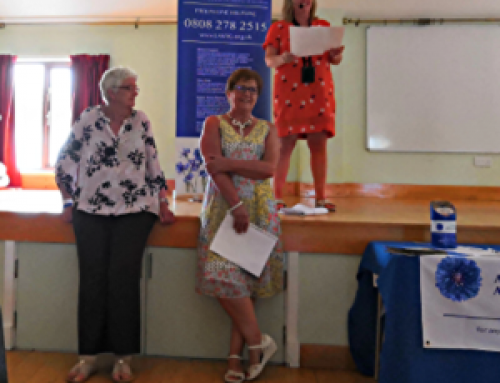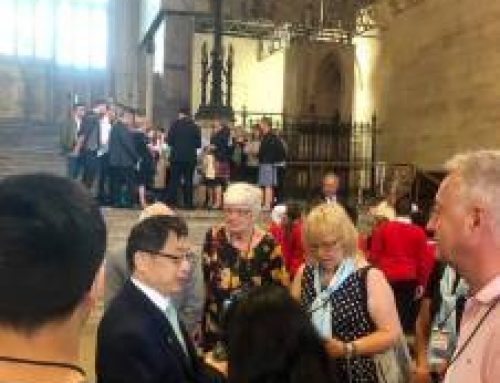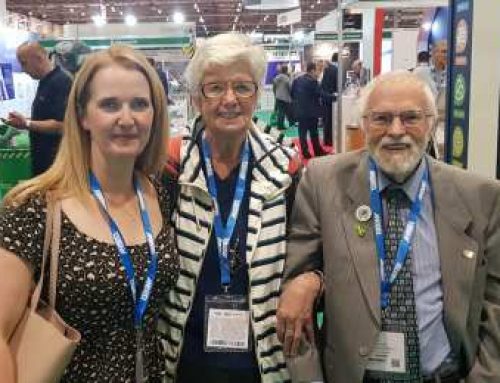Off to London again yesterday and on the way the talk on the train was that news of a bombing on the underground had come through.
Lucky we wasn’t using the underground as we pulled into Victoria and walked to the train to Denmark Hill.
We were on our way to Kings College Hospital. Wow we think our hospital is large but it is tiny compared to what was in front of us as we arrived.

It was like walking through a town with so many people. How on earth do they control a hospital as large as this.
We were on our way to the Cicely Saunders Institute as both of us were invited to talk about Patient Carer, but to be honest we didn’t know just what it was all about. Ray just trusts me that I know and I truly didn’t know.
A key objective of Cicely Saunders International is to establish the world’s first institute of palliative care, a centre of excellence housing research, education, information provision and clinical care. The Cicely Saunders Institute of Palliative Care brings together academics, healthcare professionals, community organisations, patients and carers in one centre and acts as the hub for a network of international research. By providing a comprehensive approach to the physical, social and psychological needs of people with progressive illness, the Institute’s research will feed quickly and directly into practice and policy around the world – improving palliative care and enabling people to live better, with dignity and the least possible suffering.
The Institute opened in February 2010 and is situated next to King’s College Hospital, which currently provides high-quality palliative care for patients in South East London and the surrounding area. The Institute integrates this care with teaching and research, creating a multi-professional environment examining every aspect of palliative care.
King’s College London, our academic partner at the Institute, is the largest provider of healthcare education in Europe and has an international portfolio of research. Its Department of Palliative Care, Policy and Rehabilitation has an international reputation for teaching and research. The multi-faculty nature of King’s will ensure that the profile of palliative care research and education is truly multidisciplinary and will reach a broad audience.
The building is a welcoming and peaceful environment, sensitively designed with advice from Macmillan Cancer Support and in consultation with potential users and local patient groups such as Black Cancer Care. Ongoing user involvement should ensure that patients and their carers are able to guide and participate in our vision for the Institute and its future use.
We met another couple waiting and we soon were met by Jo and taking up to the top floor where we could see the Shard in the distance.
Here we had coffee as another 2 people arrived.
Jo wanted us to talk about who we were and our stories and to interact with each other. Turns out she couldn’t have chosen a better group of people as we all interacted very well. We had to give our thoughts on Palliative Care at an early stage. I said I would ask the Mesowarriors and I did last night. The question raised to-day about Palliative care.
If they run a trial to see if Someone ran a group at your hospital of Exercise, Diet and Breathing Exercise etc etc a general keep healthy and fit when we have been diagnosed, when would you feel it was a help. At Chemo time each time, at home would you even take part.
The Mesowarriors have responded so well. I realise being in Australia is different. Yet my beautiful dad went into palliative care 2 nights before he passed on the 3rd. I was allowed to stay with him the whole time. He had a daily palliative care nurse visit at home, where my stepmother cared for him, as I’m 5 hours away. It depends on what they do. I think you need different things at different stages so I probably would take part if they were offering something useful for me at that time. My Dad has been offered all of the above by our Macmillan Nurse. He can go along to learn breathing techniques. He’s got a 12 session FREE gym member- including a one-to-one to sort out his training schedule and a carer/friend of his choice can also go along for free each visit too (carer can be different each time ??). We are in East Hertfordshire. I think the best time would be when first diagnosed as the lung cancer be trained to keep fitter ready for the rocky road ahead xxx
Anytime towards the beginning of treatment would have been helpful. A couple of weeks after surgery would have been a big help.
I would say an exercise programme from the start that will need to be monitored & adjusted depending on treatment & symptoms. Would suggest in groups (good social) aswell as individual at home. It has been a massive help to me both mentally and fitness wise. I’m fitter now than I have ever been …
I Am on present time at home I could not take part in any fitness group.
Yes, I agree. So far I’ve been offered armchair yoga at the hospice and I look forward to it every week, it does help me.
Mavis Nye
Oh brilliant I will send these answers through. Its what I say I would love to have had someone come and help me exercise and talk about diet and nutrition when I was sitting for hours on chemo. We spend so much time then reading I think I could have done armchair exercise to keep my muscles in trim.
Agreed!
There was a clinical trial of exercise listed for Meso. For me exercise has been extremely important. Physically and mentally. This has been an area that i have not had any advice on at all.. am thinking it maybe uncharted territory for the oncologists. I find that during exercise my lung performance increases.. but boy i have to work hard to get to that point. After each exercise i always feel better.. but trying to find that rest/exercise balance is trial and error.. for me it’s quite a fine line. Also exercising isn’t conducive to maintaining and gaining weight. When to exercise after treatment seems to be important as well. I’ve only done cardio exercise, be good to start doing weight based training too. I was put off exercising initially as a private nutritionist maintained that meso is an oxygen based cancer and would enhance the tumor. I did query this with a trial doctor who said this isn’t the case.
Keith Hughes I asked about what exercise programmes were available when I first saw my Oncologist and I was referred for pulmonary rehabilitation training. Now I chose surgery but I felt it helped me a lot both before and after the surgery. I am now looking to join a maintenance group. I don’t know how this works with chemo as I suspect one is less motivated to exercise after such treatment but, if it is part of a group or combined with hospital visits then, that can only be a good thing.
My Dad was offered this in Hereford when staying with me , as a day patient at local Hospice and from memory I am sure they offered something similar in Newcastle x
I would take part if it was offered. I am looking at going to a Lung Smart Exercise at a gym. I think a supervised exercise regime would be a big help.
I have sent the answers in as It adds to the day where similar answers were given.
The Afternoon soon went and even Ray had enjoyed the conversation and had told it as it is for a carer.
Jo really did learn so much from us.
We had to say goodbye with a promise to keep in touch through Social Media.
The journey home was easy although even at 2pm the trains were so packed.







Leave A Comment